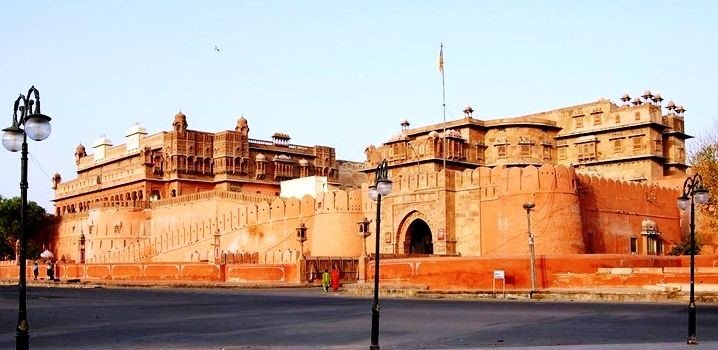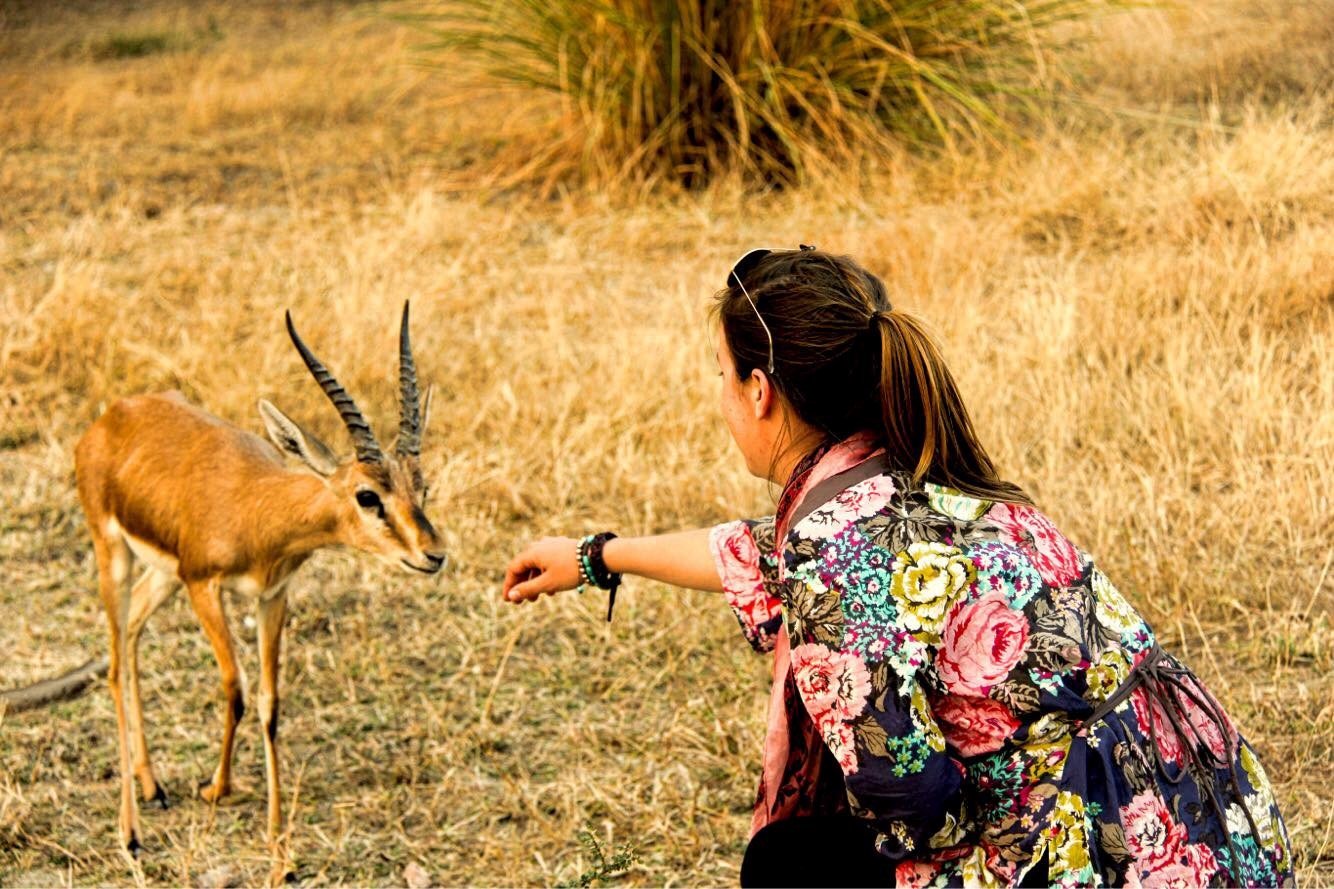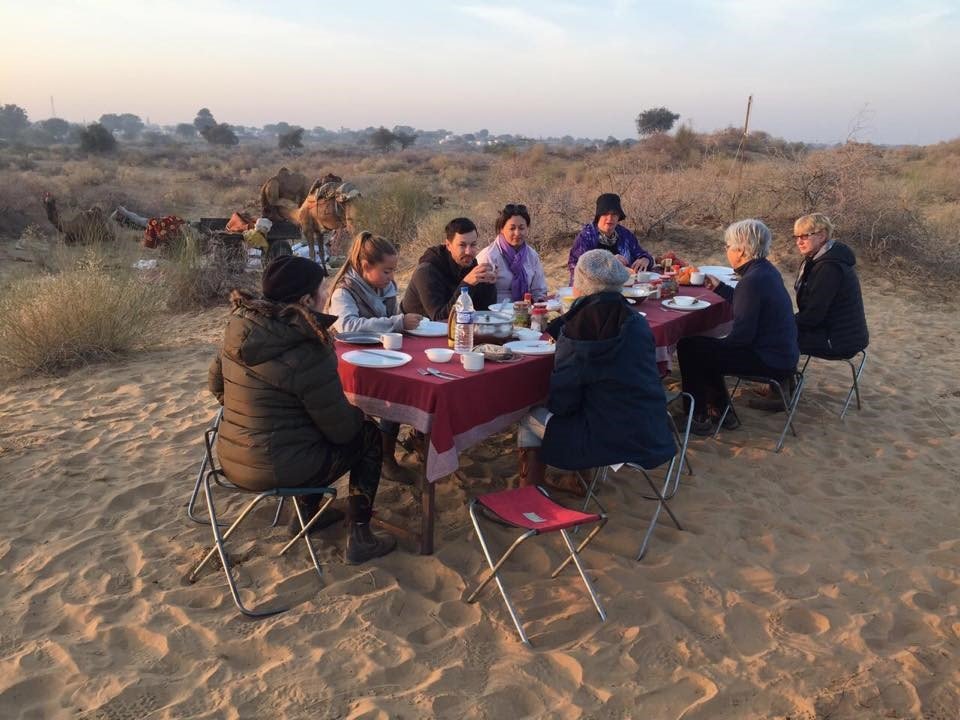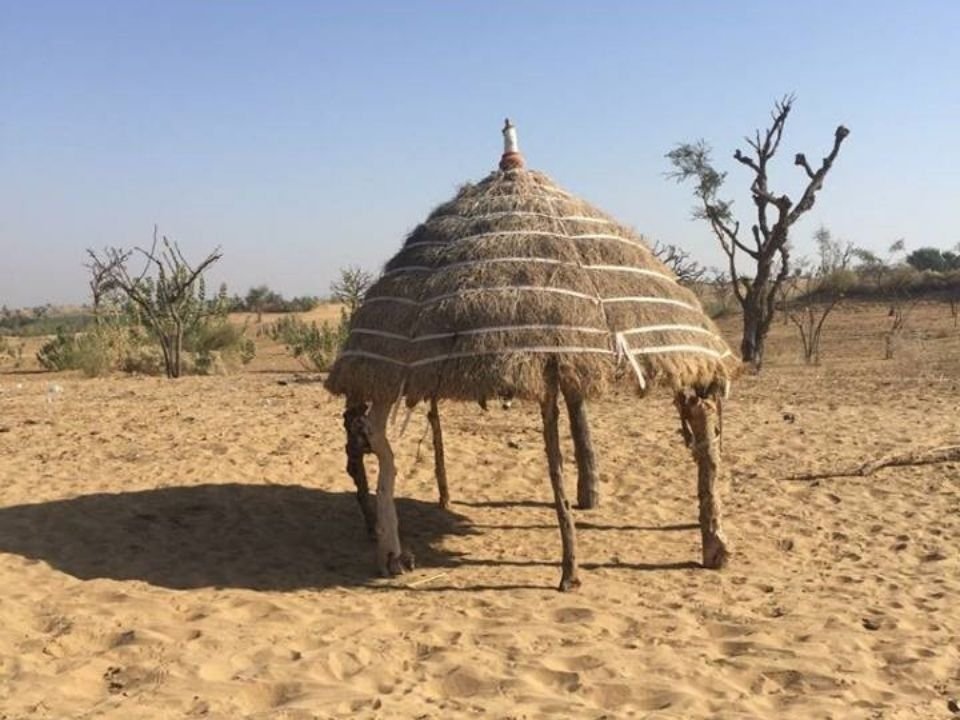Itenary for School Culture and Adventure
Visiting enchanting Rajasthan is always an exciting experience. Enriched with glorious history and culture, this 13 days and 12 nights Rajasthan tour package are one of the magnificent ways to explore the rustic beauty of the desert. From the luxury palaces to the huge forts, to the Havelis, to a safari at the Amber Fort in Jaipur, it has something fascinating to offer to everyone. You will also get captivated by the traditional folk dance and music. So, with our thoughtfully designed package, have a brush with history and return with pleasurable memories.
(Day 01) 15/12/2019 : Chandigarh to Bikaner

On arrival at Chandigarh our representative meets you at the meeting point & welcomes the guest with a traditional Indian greeting or gesture of respect, made by bringing the palms together (NAMASTEY) and assists you till your check in process at the hotel.
- 9 hours 50-minute drive in bus 585 km
- Stay overnight at the hotel in Bikaner
(Day 02) 16/12/2019: Bikaner Local Sightseeing
- After breakfast, transfer to monuments
Bikaner is a city in the north Indian state of Rajasthan, it’s surrounded by the Thar Desert. The city is known for the 16th-century Junagarh Fort, a huge complex of ornate buildings and halls. Within the fort, the Karni Mata Temple is home to many rats considered sacred by Hindu devotees.
Junagarh Fort was constructed in the year 1593 by Raja Rai Singh. It is believed that crocodiles were bred in the water moat surrounding the formidable fort. The construction is a fine blend of Mughal, Gujarati and Rajput style of architecture. The picturesque courtyards beautify the fort. The amazing architecture inside the fort inspires you. Some of the attractions inside the fort are Anup Mahal, Chandra Mahal, Hawa Mahal, Dungar Mahal, Diwan-e-khas and Ganga Mahal.


- Lunch at a local restaurant.
Deshnok is perhaps the most famous for its Karni Mata Temple where rats are worshipped. This 600 year old temple is the subject of a famous legend and is an important pilgrimage site for many. The rats here are revered and draw many devotees from different parts of India. Many western tourists also heavily visit to observe the uniqueness of this temple. Navratri is an important festival celebrated here most devotees visit during this time.
- Dinner at hotel
- Overnight at hotel
(Day 03) 17/12/2019 : Bikaner to Thar Desert
- After Breakfast
- Drive towards the starting point of the trek
- Arrival at Village in thar desert
The Thar Desert, also known as the Great Indian Desert, is a large arid region in the northwestern part of the Indian subcontinent that covers an area of 200,000 km2 (77,000 sq mi) and forms a natural boundary between India and Pakistan. It is the world’s 18th largest desert, and the world’s 9th largest subtropical desert.
The Thar Desert extends between the Aravalli Hills in the north-east, the Great Rann of Kutch along the coast and the alluvial plains of the Indus River in the west and north-west. Most of the desert is covered by huge shifting sand dunes that receive sediments from the alluvial plains and the coast. The sand is highly mobile due to strong winds occurring before the onset of the monsoon. The Luni River is the only river integrated into the desert.
- Dinner & overnight in tents.

- 10h00: trekking for 2 hrs
- Lunch in the middle of the desert (fresh lunch will be prepared in the desert).
- Some free time to relax under the tree shadow.
- 15h00: Trekking for 02 hrs
- Arrival in village.
- Installation in camp (camp situated near Village).
- Tea/Coffee , cookies & vegetable pakoras
- Dinner around Campfire
- Overnight in tents.

(Day 04) 18/12/2019 : THAR DESERT
• 08h00 – 09h00: Breakfast
• Trekking For 15 km towards
• Lunch in the middle of the desert (fresh lunch will be prepared in the desert).
• Some free time to relax under the tree shadow.
• 15h00: trekking for 10 km
• Arrival in village.
• Installation in camp (camp situated near Village)
• Dinner & overnight in tents.
(Day 05) 19/12/2019 : THAR DESERT
• 08h00 – 09h00: Breakfast
• 10h00: Trekking for 15 km towards
• Lunch in the middle of the desert (fresh lunch will be prepared in the desert).
• Some free time to relax under the tree shadow.
• 15h00: Trekking for 10km
• Arrival in village.
• Installation in camp (camp situated near Village).
• Overnight in tents.


(Day 06) 20/12/2019 : THAR DESERT
- 08h00 – 09h00: Breakfast
- 10h00: Trekking for 14 km towards
- Lunch in the middle of the desert (fresh lunch will be prepared in the desert).
- Some free time to relax under the tree shadow.
- 15h00: Trekking for 11 km
- Arrival in village.
- Installation in camp (camp situated near Village). Overnight in tents
Desert Safari is a thrilling experience in Infinite Ocean of sand in Rajasthan. It is quite a new adventure in the smooth path of the desert. The beauty of the desert keeps on changing in every season. It looks all the more beautiful especially after rains. The beauty of the desert can be enjoyed by riding over camels or camel carts. Wide spread tranquility welcomes tourist at every step. Villages in Rajasthan are well known for its intricate architecture.
(Day 07) 21/12/2019 : THAR DESERT
- 08h00 – 09h00: Breakfast
- 10h00: Trekking for 15 km
- Lunch in the middle of the desert (fresh lunch will be prepared in the desert).
- Some free time to relax under the tree shadow.
- 15h00: Trekking for 10 km
- Arrival in sand dunes
- Installation in camp (camp situated near Village).
- Tea/Coffee, cookies & vegetable pakoras
- Dinner around Campfire
- Overnight in tents



(Day 8) 22/12/2019 : THAR DESERT
- After breakfast in desert
- trekking for 15 km
- Lunch in the middle of the desert (fresh lunch will be prepared in the desert).
- Some free time to relax under the tree shadow.
- 15h00: Trekking for 10 km
- Arrival in sand dunes
- Installation in camp (camp situated near Village).
- Tea/Coffee, cookies & vegetable pakoras
- Dinner around Campfire
- Overnight in tents
(Day 9) 23/12/2019 : THAR DESERT TO BIKANER
- After breakfast in desert
- Trekking for 20 km
- Lunch near BSF post in desert (fresh lunch will be prepared in the desert).
- Safari terminates & transfer towards Bikaner by Jeep.
- Check-in at Hotel
- Dinner and Overnight at hotel
(Day 10) 24/12/2019 : BIKANER TO SAM (JAISALMER) (380 KM / 6 HOURS)
- After breakfast in Hotel
- Drive towards Jaisalmer
- Check-in at Camp in Sam
An excursion to Sam (45 km away) and camel ride on the sand dunes in the evening followed by an overnight stay at the hotel (or camp).
Sam is located on the outskirts of Jaisalmer and is famous for sand dunes which can be enjoyed best by a camel ride. Culture and folklore are enjoyed here amidst the dunes during the Desert festivals.
(Day 11) 25/12/2019 : SAM TO JAISALMER CITY (50 KM 1 HOUR)
- After breakfast in Camp
- Drive towards Jaisalmer City
A drive to Jaisalmer and check-in at hotel followed by a guided tour around the city. A visit to the citadel or the Jaisalmer fort, the golden fantasy in the thar Desert, in the morning, Jaisalmer or better known as the golden city is named after its founder Rawal Jaisal,a Bhati rajput ruler. Withstanding the buffering winds of the desert are the magnificent havelis with crenelated sandstone walls. Also known as gateway of the desert, this city gives one the Arabian night’s feel as it rises out of the barren dessert like an approaching ship.
The highlights of our tour in Jaisalmer will be the fort palace museum Gadsisar lake ,Patwaon ki haveli ,and Jain temples.
Overnight Stay at Hotel
(Day 12) 26/12/2019 : Jaisalmer / JODHPUR (285 kms / 4 hrs 35 minutes)
- Breakfast at hotel
- Drive towards Jodhpur.
- Arrive at hotel in Jodhpur and check-inn
Jodhpur is a city in the Thar Desert of the northwest Indian state of Rajasthan.
Its 15th-century Mehrangarh Fort is a former palace that’s now a museum, displaying weapons, paintings and elaborate royal palanquins (sedan chairs). Set on on a rocky outcrop, the fort overlooks the walled city, where many buildings are painted the city’s iconic shade of blue.
Lunch at local restaurant.
A Delightful Blend of the Modern and the Traditional

Jodhpur, the second largest city in Rajasthan is popularly known as the Blue City. The name is clearly befitting as most of the architecture – forts, palaces, temples, havelis and even houses are built in vivid shades of blue. The strapping forts that tower this magnificent city sum up to a spectacle you would not want to miss. The mammoth, imposing fortress of Mehrangarh has a landscape dominating a rocky ridge with the eight gates leading out of the fortress. The new city is located outside the structure. Jodhpur is also known for the rare breed of horses known as Marwari or Malani, which are only found here.
Jodhpur marks its origin back to the year of 1459 AD. The history of this prosperous city revolves around the Rathore clan. Rao Jodha, the chief of Rathore Clan is credited with the origin of Jodhpur in India. The city is known to be built in place of the ancient capital, Mandore of the state of Manwar. Hence, the people of Jodhpur and surrounding areas are commonly known as Marwaris. Also, it is believed that the relics of Mandore can still be witnessed in the Mandore Gardens.
Overnight at hotel
DAY 13 : 27/12/2019 : JODHPUR TO JAIPUR (280 KM/ 4 HOURS 50 MINUTES)
- Breakfast at hotel and check-out
- Board in bus
- Check in at Hotel

Jaipur is capital of Rajasthan. It was painted in pink colour a century ago in honour of a visiting prince. Ever since, Jaipur has retained this pink colour. Built by Maharaja Jai Singh, a notable astronomer, this city is 260 years old. While in Jaipur, visit Maharaja’s City Palace, the Observatory and Ram Niwas Gardens. Drive past the Hawa Mahal. Hawa Mahal or Palace of the Winds, or also called Palace of the Breeze, is one of the important places to visit in Jaipur. Built by Maharaja Sawai Pratap Singh in 1798, Hawa Mahal is a five-storey extension in the form of a honeycomb. This unique building has 953 small windows, called jharokas, decorated with intricate lattice work. The entire palace represents the crown of the Hindu God, Lord Krishna


Lunch at Local Restaurants.
Amber Fort was the capital of this state long time ago. Visit the Sheesh Mahal or the Hall of Victory glittering with mirrors.
Located amidst the picturesque and rocky Aravalli Hills, the foundation stone of this palace was laid by Raja Man Singh I and was completed by Mirja Raja Jai Singh. Beguiling beauty of the red sandstone and white marble adds to the magnificence.

While the high formidable walls defended its residents from enemy attacks, the main building of the citadel served its people with all the luxuries and amenities. The scenic backdrop of the Maota Lake and panoramic views of sunrise and sunset contribute to the eternal beauty of this palace. Intricate wall paintings, frescos and the use of precious gems and jewels in these paintings add to its timeless beauty.
Sheesh Mahal or the ‘Palace of Mirror’ is also one of the captivating halls to visit within Amber Palace. Decorated with numerous pieces of mirror tiles, this hall was designed in such a way, even a single ray entering into it can illuminate the entire hall.
- CITY PALACE
Located in the heart of Jaipur, City Palace is the most remarkable monument in the list of places to visit in Jaipur. Guarded by huge impounding walls, this palace is a fusion of Rajput and Mughal architecture. Whether with its everlasting architecture or the enchanting decorations, City Palace has kept the amplitude of the Rajputs alive.
Constructed during 1729-1732, under the supervision of Maharaja Sawai Jai Singh II, the City Palace boasts of very minute detailing. Chandra Mahal and Mubarak Mahal comprise the major portion of this palace. Udai Pol, Jaleb Chowk, Tripolia Gate and Virendra Pol are the entrances to this palace. Embossed with fine artworks and engravings, every corner of this palace is filled with immemorial imprints from the past.
-
JANTAR MANTAR
Maharaja Sawai Jai Singh, the ruler of Jaipur was one of the best theorists of ancient India. After achieving the milestones of constructing the planned city Jaipur, as well as several other scientific and architectural epitomes, the Maharaja built five astronomical instruments to study space. These instruments were called Jantar Mantar, which means Calculating Instrument. The largest of these instruments is located in Jaipur and has been declared as a World Heritage Site by UNESCO.
City Palace is now a famous museum and the beautiful lake surrounding the palace will definitely amuse you.
Overnight at Hotel
(Day 14) 28/12/2019 : JAIPUR TO CHANDIGARH (510 KM / 8 HOURS 40 MINUTES)
Morning drive from Jaipur to Chandigarh
TOUR CONCLUDES, HAPPINESS CONTINUES….
